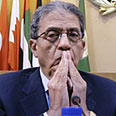
Arab League Secretary General Amr Moussa
צילום: AP
Arab mediators expected to seal Beirut deal
Arab League delegation to Lebanon to announce talks in Qatar aimed at resolving dispute over how to share power in cabinet and details of new parliamentary election law
An Arab League delegation is expected to conclude a deal in Lebanon on Thursday, defusing a crisis that led to six days of armed conflict and threatened to start a new civil war.
The delegation is expected to announce talks in Qatar aiming to resolve the broader political conflict that has paralyzed Lebanon for 18 months and is seen as a proxy struggle between the United States and Iran.
The US-backed government cancelled measures on Wednesday that had angered Hizbullah and triggered a military campaign by the powerful Iranian-backed Shiite group against Lebanese foes it said had declared war.
The cancellation met one of Hizbullah's demands and eased tension in Beirut, which the group briefly controlled during a campaign that triggered fighting with Sunni and Druze government supporters.
At least 81 people were killed in the fighting, the worst among Lebanese since the 1975-90 civil war.
Hizbullah, which leads an alliance of opposition factions, also demanded the ruling coalition agree to talks as a condition for ending a civil disobedience campaign which has included roadblocks that have paralyzed the capital.
The roadblocks, including barricades on the airport road, are expected to be lifted on Thursday after the Arab League delegation, headed by the prime minister of Qatar, announces agreement on the talks to be held in Doha.
Struggle for influence
The talks will tackle the dispute over how to share power in the cabinet and the details of a new parliamentary election law. It is not clear when they will begin. The row has paralyzed much of government and left Lebanon with no president since November.
The dispute is seen as a struggle for influence between Syria, which backs the opposition, and Saudi Arabia, which supports the ruling coalition. Any deal would result in army commander General Michel Suleiman being elected head of state. The United States has blamed the trouble in Lebanon on Iran, Syria and Hizbullah—a political movement with a powerful guerrilla army.
Iran blames the United States for the violence, which erupted after government action to outlaw a communications network vital to Hizbullah's military and security wings.
The ruling coalition accuses the opposition of trying to restore Syrian control of Lebanon and secure a stronger foothold for Iran in the country.
Syria dominated Lebanon until 2005, when the assassination of statesman Rafik al-Hariri triggered international pressure that forced it to end its military presence after nearly three decades and plunged the country into crisis.










